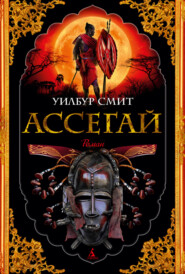По всем вопросам обращайтесь на: info@litportal.ru
(©) 2003-2025.
✖
Pharaoh
Автор
Год написания книги
2019
Настройки чтения
Размер шрифта
Высота строк
Поля
The three of us rode well ahead of the rest of the party. Hui and Rameses hung back tactfully to let the two sisters and me resume our very singular relationship. There was so much for us to recall and delight in that the time was not enough, before we found ourselves before the main gates of the citadel of Sparta, the Loveliest One.
Although an army of slaves had been labouring upon it for many decades it was not yet completed, but I judged that its mighty walls and systems of moats and fortifications would be able to repel the greatest and most determined army of any potential enemy of which I was aware. I reined in my horse in order to admire it in detail, and while I was doing so Hui and Rameses rode up to join us.
Both Tehuti and Bekatha immediately transferred their attention from me to Rameses. I did not resent this. They had given me more than my full share, and Rameses was truly a striking-looking man. In all fairness I knew of no other to match him; well, perhaps that is not strictly correct but modesty precludes me from further comparisons. So I retired gracefully into the background.
‘And who might you be, young sir?’ Bekatha was never one to hang back. She studied Rameses boldly.
‘I am not anybody of particular account, Your Royal Highness.’ Rameses dismissed her query with a modest smile. ‘I am merely the captain of the ship which brought Lord Taita to visit you on your lovely island. I am named Captain Rammy.’ He and I had agreed not to prattle about his close links to the throne of Egypt. We were both fully aware that Pharaoh Utteric Turo the Great had his spies in high and unlikely places.
Tehuti was studying Rameses with an intensity which was much more telling than her little sister’s eager prattle.
‘You are a member of the Egyptian royalty.’ When she spoke Tehuti made it sound like an accusation and a challenge.
‘How did you know that, Your Majesty?’ Rameses was nonplussed.
‘When you speak your accent is unmistakable.’ Tehuti went on studying his face a few moments longer, and then she said with certainty, ‘You remind me of somebody I knew well but whom I have not seen in many a long year. Let me think!’ Then her expression changed again, becoming more eager and fascinated. ‘You remind me of my brother Pharaoh Tamose—’ She broke off and stared at her reluctant relative. ‘Rammy! Yes of course! You are my nephew Rameses.’ She turned away from him and focused her disapproval on me, but her censure was alleviated by the sparkle of happiness in her eyes and the barely suppressed laughter on her lips. ‘You naughty, naughty man, Tata! Whatever gave you the notion of trying to dupe me? As if I would not have known my own flesh and blood. I taught this little hellion his first swear words. Don’t you remember, Rameses?’
‘Shit and corruption! And bugger me sideways! I remember them so well.’ Rameses merged his laughter with hers. ‘I was only about three or four years old at the time and you were an old lady of sixteen or seventeen, but I will never forget those sweet words of wisdom.’
Tehuti leaped from the back of her mount and spread her arms wide in invitation. ‘Come and give your old auntie a kiss, you horrid child!’
I watched the two of them embrace with pleasure; and this was not solely because I was no longer obliged to leap from the end of the earth into eternity to make good my pledge to Rameses. It took some time for the greeting ceremony to run its course because naturally Bekatha felt obliged to add her considerable weight to the occasion, but finally we were free to mount up again and continue on our way to the citadel. The two sisters rode within touching distance of Rameses, one on each side of him.
The gates were thrown wide open as we approached the citadel and King Hurotas scrambled down the scaffolding which still covered part of the new fortifications and on which he had been directing the builders. In appearance he seemed more like a workman himself than a king, covered as he was by dust and grime. Of course he had recognized me from afar. I am not a person who is easy to overlook, even in a crowd. And then he had been intrigued to see his own wife and her sister clinging adoringly to the young stranger who rode between them.
‘This is my nephew Rameses!’ Tehuti yelled at her husband when they were still separated by fifty paces.
‘He is our brother Tamose’s second eldest son,’ Bekatha endorsed the relationship. She was making absolutely certain there was no misunderstanding as to what was meant by the word ‘nephew’. ‘And he is next in line to the throne of Egypt after you and Taita have ridded the world of Utteric.’ I was taken a little aback at her assumption of our future role as kingmakers. However, Hurotas was obviously inured to her flights of fantasy. He came on readily to embrace Rameses, and transfer to his admiral’s uniform a liberal portion of the builder’s muck that covered his royal personage.
At last he drew back and announced every bit as loudly as Bekatha had done, ‘This calls for a celebration to welcome Prince Rameses. Tell the chefs that I am hosting a banquet this evening, with the best wine and good food for everybody.’
That evening the inner courtyard of the citadel was lit by a dozen large bonfires and trestle tables sufficient to seat several hundred of the most important nobles of Lacedaemon. The king and his immediate family sat in the centre of a raised dais where they were visible to all the lesser creatures in creation. Of course I sat between my two former charges, Tehuti and Bekatha. Directly below us were seated the sons of Bekatha and Hui. These were the four splendid young men that had accompanied their father to Egypt on the campaign to rid the world of King Khamudi. Although I had met them only briefly at that time I am an infallible judge of humanity. I knew that Bekatha had bred true to her line of Pharaohs and that her sons were choice specimens of the Egyptian nobility. Two of her boys were already married and their pretty little wives sat with them. They were all close in age to Rameses, and they were treating him like the honoured guest he so clearly was. I expressed my approval of them to Bekatha, their mother, and she took it as nothing more than their due.
‘In fact I had hoped that one of my boys would marry their cousin, Serrena,’ she confided in me. I was by this time aware that Serrena was the name of Tehuti’s mysterious and elusive daughter, whose empty chair awaited her arrival to sit beside her father King Hurotas at the head of the festive table. Bekatha went on speaking with barely a pause for breath: ‘All four of them pressed their suits to her, one after the other. But she turned them down prettily with the excuse that she could not marry someone with whom she had bathed naked as a child, and had discussed their differing genital structures while sharing the same piss pot. I wonder what excuse she had for the hundred and one other suitors who have come in a constant stream from the ends of the earth to ask for her hand in marriage.’
‘I look forward to meeting her. I gather that she is a very handsome young lady,’ I acknowledged, and Bekatha went on enlarging on the subject.
‘Everybody and their uncles say that she is the most beautiful girl in creation, a fitting rival to the goddess Aphrodite; but I cannot see it myself. Anyway, Serrena is so fussy in her choice of a husband that she will most probably die an old spinster.’ Bekatha shot a teasing glance at her sister on the other side of me. Tehuti had followed our conversation but she did not deign to reply and merely stuck out the tip of her pink tongue in Bekatha’s direction.
‘Where is this paragon of feminine pulchritude?’ I demanded. None of this was news to me, but I thought it best to divert the two of them from their discussion before it boiled over from fun into fury. ‘Will she be joining us this evening?’
‘Do you see an empty stool anywhere in the courtyard?’ Bekatha asked, and looked pointedly in the direction of King Hurotas who was sitting across the table from us. The seat at his left hand was the only one in the packed courtyard that was presently unoccupied. Bekatha grinned and answered her own question before her elder sister could reply, ‘Princess Serrena of Sparta marches to the beat of her own drum which she alone can hear.’
She said it in a jocular tone, almost as though she meant it as a compliment rather than an accusation. But King Hurotas, who had been following the conversation, leaned forward quickly and intervened: ‘When a beautiful woman is only an hour late it is because she is making a particular effort to be on time.’
Bekatha subsided immediately and I realized who truly ruled this kingdom and where his devotions lay. There was an almost immediate lull in the clamour of festivities, and I thought for an instant that the rest of the company was reacting to the king’s rebuke, but then I realized that very few of them could have overheard it, and that they were paying no heed to Hurotas or anyone else in the courtyard. Instead every head was turning towards the main doors opening out into the courtyard from the citadel.
Through them walked a young woman. This is an inaccurate description of her entrance into my life, and that of Rameses. Princess Serrena did not walk; she glided without appearing to move any part of her body, for the long skirts she wore screened her legs and lower parts from her hips downwards. Her hair was piled high on her head, a crown of dense shimmering gold. The lightly sun-tanned skin of her arms and shoulders was as unblemished and glossy as polished marble or freshly woven silk. She was tall, but her body was perfectly proportioned.
She was not pretty, because that adjective suggests a simpering vacuity. She was simply magnificent. Every facet of her face was perfection. When taken together they exceed my powers of description. As she moved her features changed subtly, perfection surpassing perfection. She captivated every person who looked upon her. However, her single most striking feature – if it were possible to distinguish it – was her eyes. These were enormous but in perfect harmony with the rest of her face. They were a particular shade of green that was brighter than any emerald. They were also piercing and perceptive, but at the same time clement and forgiving.
Вы ознакомились с фрагментом книги.
Приобретайте полный текст книги у нашего партнера:
Приобретайте полный текст книги у нашего партнера:














